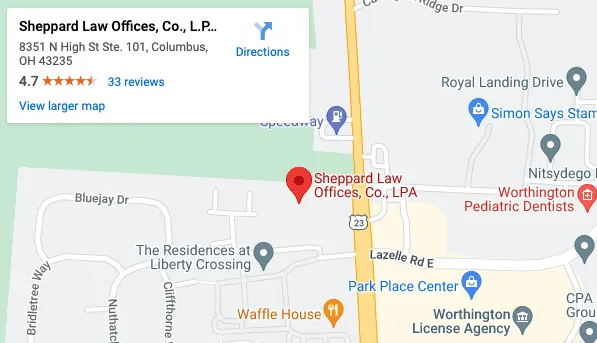Taking Charge of Your Healthcare Future: Advance Directives in Ohio
Life can be unpredictable. While we may not know what the future holds, we can take steps to ensure our wishes are respected and our loved ones are prepared. This is where advance healthcare directives and estate planning come in.
Estate planning is about much more than disposing of your assets after your death. An important part of your estate plan deals with decision-making for your care during life, if you are unable to make or express decisions for yourself. Advance directives are a category of documents that allow you to plan for the event of your own incapacity.
Quick Summary:
- An advance healthcare directive outlines your medical wishes if you can’t speak for yourself. It ensures follow-up on your wishes and alleviates stress on loved ones.
- Advance healthcare directives come in two main forms.A living will outlines treatment wishes. A power of attorney appoints a decision-maker when you’re unable. These documents ensure respect for your healthcare choices.
- In Ohio, creating advance healthcare directives is easy. You can download free forms for a living will or healthcare power of attorney. Choose a trusted decision-maker, and have witnesses or a notary verify your documents.
- Talk to your doctor about a DNR order if you wish. Remember to update these documents as needed.
What is an Advance Healthcare Directive?
An advance directive is a written statement of a person’s medical treatment preferences. It comprises a living will and ensures that medical staff follow these preferences if the person cannot communicate.
Why is it Important to Have an Advance Healthcare Directive?
Unexpected illness or accidents can leave us unable to speak for ourselves. An advance healthcare directive gives you a voice. The following are some of the reasons advance directives matters:
- Ensures your wishes are followed: Makes sure you get the medical care you want if you can’t speak for yourself.
- Reduces stress on loved ones: Takes the burden of difficult healthcare decisions off your family.
- Avoids confusion: Provides clear instructions for doctors in complex situations.
- Making Modifications – Update your advance directives to match your changing healthcare wishes. Life changes and can throw curveballs our way. If you dictate your advance directive and decide to change it, it is not set in stone. You can change your living will or any of the people you gave representative power to at any time
Understanding Your Options: Types of Advance Healthcare Directives
Healthcare directives convey your care preferences when you’re unable to communicate. There are multiple types of advance directives, each with different functions.
Ohio recognizes two primary types of advance healthcare directives:
- Living Will (or Health Care Declaration): It is named a living will because of these “life-sustaining medical treatments” you want or don’t want if you can’t speak for yourself (e.g., use of life support). Living will only activate when you’re unconscious.
- Durable Power of Attorney for Health Care: This document, also known as a medical power of attorney or medical POA, allows you to name a trusted person to make medical decisions for you if you are unable to communicate on your own. The person you name to make these decisions is usually called your agent or attorney-in-fact.
This statement can be in conflict with this guardians and conservators are court-appointed decision-makers. This appoints a trusted person to make medical decisions for you if you’re unable to.
- Other Names for Health Care Agents – In addition to “agent” or “attorney-in-fact,” health care representatives are sometimes also called “proxies,” “patient advocates,” “surrogates,” or something similar. But if you hear the term “guardian” or “conservator,” that probably means something different.
Guardians and conservators are court-appointed decision makers, unlike those that you appoint yourself in a health care directive. One of the best reasons to make health care directives is to avoid complicated or stressful conservatorship or guardianship proceedings. If you become incapacitated and don’t have a health care directive that names someone to make health care decisions on your behalf, your loved ones will need to initiate these court proceedings. For more information, see Conservatorships and Adult Guardianships
Some states combine these into a single Advance Directive. There are also some additional options, including:
- Do Not Resuscitate (DNR) Order: Ohio’s Do-Not-Resuscitate Law lets individuals limit emergency care, including when calling 911. A Do Not Resuscitate order directs doctors and medical personnel not to perform cardiopulmonary resuscitation on you if your breathing stops or if your heart stops beating. A DNR is a medical order written by a doctor at your request
- POLST Form: In almost all states, you have yet another option for setting out your wishes—a Physicians Orders for Life Sustaining Treatment (POLST) form (also called a POST, MOLST, or MOST form, among other terms). POLST forms allow you to express your wishes for care in a medical emergency. In this way, they are similar to DNR orders. However, a POLST form covers more medical decisions than a DNR order. For example, you can use a POLST form to state your wishes about intubation, antibiotic use, and feeding tubes.
How to Create Advance Healthcare Directives in Ohio?
Taking control of your healthcare future is empowering. Here’s how to create valid advance healthcare directives in Ohio:
Living Will
- Obtain a Form: Download a free Ohio Living Will Declaration from reliable sources like the Ohio Bar Association or LeadingAge Ohio.
- Complete the Document: Fill in the information clearly. Specify your wishes regarding life-sustaining treatment in terminal illness or permanent unconsciousness.
- Witnessing or Notary: Choose one of these options for validation:
-
- Two Witnesses (over 18): Two adult witnesses, unrelated to you and not potential heirs, must sign in your presence, confirming your sound mind.
- Notary Public: Have the document notarized, ensuring you signed willingly without coercion.
4. Safekeeping: Keep the original document with you. Provide copies to healthcare providers, trusted family members, and your agent if you have one.
Healthcare Power of Attorney
- Select an Agent: Choose a trusted individual (over 18) who understands your wishes and is comfortable making healthcare decisions for you.
- Obtain a Form: Similar to Living Wills, you can find free Ohio DPOA-HC forms online from reputable sources.
- Complete the Document: Appoint your chosen agent and consider including specific limitations or instructions for their decision-making.
- Signing and Witnessing: You and your agent must both sign the form. Witnessing requirements are similar to the Living Will, requiring two witnesses or a notary.
- Distribution: Share copies with your healthcare providers, agents, and trusted loved ones.
Do Not Resuscitate (DNR) Order:
A DNR is not technically an advance directive. A DNR is a medical order written by a doctor at your request.
- Discuss with your Doctor: DNR is a medical decision best made in consultation with your physician. They will explain the implications and complete the order if you choose to proceed.
- Documentation: Your DNR will be documented in your medical record. It communicates your wishes to healthcare personnel during emergencies.
Remember to regularly update your advance directives to match your changing healthcare wishes. Communication with your doctor and loved ones ensures your wishes are honored.
Why Do I Need an Estate Planning Lawyer in Ohio?
Advance healthcare directives empower medical decision-making, yet legal navigation can be tricky. In Ohio, while basic directives can be created without a lawyer, there are benefits to considering legal assistance.
- Complexities and Clarity: Consult a lawyer for legally sound directives for complex healthcare needs or specific wishes. They can help include precise medical instructions, minimizing misinterpretation.
- Family Dynamics and Potential Disputes: For potential family disagreements, an attorney can assist in crafting clear directives, reducing conflict risk. Their experience ensures your wishes are respected during emotional times.
- Estate Planning Integration: Advance healthcare directives are part of estate planning. An estate lawyer can design a plan covering healthcare, assets, and guardianship. They ensure all aspects of your plan are comprehensive.
Call our Columbus OH Estate Planning Attorney Now!
Advance healthcare directives empower you to shape your medical future. Filling basic forms seems simple, but consulting an OH lawyer brings significant advantages.
At Sheppard Law Offices, we can make the estate planning process easy for you. Our Ohio estate planning lawyer ensures your documents comply with the law, avoiding confusion. This is particularly beneficial for complex health situations, family disagreements, or comprehensive planning needs. In these cases, our legal team can help you out!
Sheppard Law Offices serves individuals, families, and small businesses throughout Ohio. We have offices in Columbus Mount Vernon and Newark that can help you with the following practice areas:
Contact Sheppard Law Offices today to schedule your free consultation.


